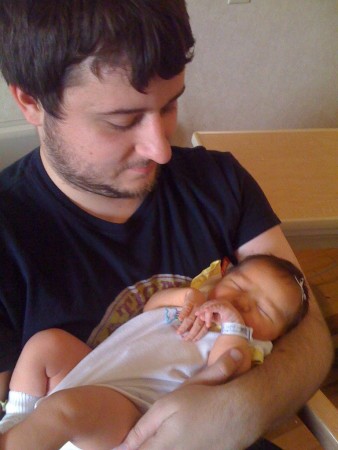 First off, please join me in welcoming the newest member of the family, baby Amara, my niece! She’s adorable, well-behaved, and loves to sleep. She’s at risk of jaundice, so I’m sure she would appreciate all of your prayers. [If you’re reading this by RSS feed, there are two pictures on this post: Amara and me; and Amara and baby Jude, her cousin].
First off, please join me in welcoming the newest member of the family, baby Amara, my niece! She’s adorable, well-behaved, and loves to sleep. She’s at risk of jaundice, so I’m sure she would appreciate all of your prayers. [If you’re reading this by RSS feed, there are two pictures on this post: Amara and me; and Amara and baby Jude, her cousin].
Amara’s mother (my sister) was raised Catholic, while Amara’s father was raised Lutheran. The two are now trying to figure out which faith to baptize the baby into. In response to this, we sat down together to look at the Biblical evidence. Specifically, the question was: why do we need priests to do Baptisms? Where does the Catholic priesthood come from?
The question’s a complex one with many possible Biblical answers. You can look to the Last Supper (particularly combining John’s Gospel, with the mandatum, with what the three parallel accounts have to say about the Eucharist’s role at the Last Supper). I outlined that understanding roughly in this post from Maundy Thursday. Yesterday, I decided to go in a different direction entirely, relying more heavily upon the Old Testament.
I. What About the Priesthood of All Believers?
First, I started with the Lutheran case against the priesthood. It’s based in this notion of what Luther termed ‘the priesthood of all believers.’ And as these two passages which I pulled from Wikipedia show, he relied in particular on one verse, 1 Peter 2:9.
- That the pope or bishop anoints, makes tonsures, ordains, consecrates, or dresses differently from the laity, may make a hypocrite or an idolatrous oil-painted icon, but it in no way makes a Christian or spiritual human being. In fact, we are all consecrated priests through Baptism, as St. Peter in 1 Peter 2[:9] says, “You are a royal priesthood and a priestly kingdom,” and Revelation [5:10], “Through your blood you have made us into priests and kings. – Martin Luther, Weimar Ausgabe, vol. 6, p. 407, lines 19-25 as quoted in Timothy Wengert, “The Priesthood of All Believers and Other Pious Myths,” page 12
- How then if they are forced to admit that we are all equally priests, as many of us as are baptized, and by this way we truly are; while to them is committed only the Ministry (ministerium Predigtamt) and consented to by us (nostro consensu)? If they recognize this they would know that they have no right to exercise power over us (ius imperii, in what has not been committed to them) except insofar as we may have granted it to them, for thus it says in 1 Peter 2, “You are a chosen race, a royal priesthood, a priestly kingdom.” In this way we are all priests, as many of us as are Christians. There are indeed priests whom we call ministers. They are chosen from among us, and who do everything in our name. That is a priesthood which is nothing else than the Ministry. Thus 1 Corinthians 4:1: “No one should regard us as anything else than ministers of Christ and dispensers of the mysteries of God.”– Martin Luther, Babylonian Captivity of the Church (1520):
The argument in a nutshell is:
(a) 1 Peter 2:9 says “You are a chosen race, a royal priesthood, a priestly kingdom.”
(b) Therefore, all believers are priests.
(c) Therefore, an ordained priesthood distinct from the body of believers is an anti-Biblical aberration.
The problem with this view can be seen quite easily. 1 Peter 2:9 is an almost verbatim citation to Exodus 19:6, where God says to Israel, “you shall be to Me a kingdom of priests and a holy nation.” Yet in the Old Testament context, the fact that the whole people were priestly did not prevent God from setting apart certain ones among them to also be priests: specifically, the Aaronic/Levitical priesthood. So Luther’s argument from Scripture just doesn’t cut it. If (a) and (b) lead to (c) in the New Testament, they would have lead to (c) in the Old, and they don’t — Lutherans will freely acknowledge that there was a valid and God-ordained sacrificial priesthood distinct from the priestly people.
What’s more striking is that there was someone who took Luther’s argument and ran with it, in the Old Testament. Just as Fr. Martin Luther, a Catholic monk, turned against the Catholic system, a Levite by the name of Korah turned against the Levitical system. And his argument is eerily parallel to Luther’s own (as seen above). Taking with him 250 men who were leaders in the Jewish community, they say to Moses and Aaron: “Enough from you! The whole community, all of them, are holy; the LORD is in their midst. Why then should you set yourselves over the LORD’S congregation?” (Numbers 16:3). In other words, if we’re all a priestly people, why do we need you lording yourselves over us? What about Church democracy? After all, these are the people who were “members of the council and men of note” (Numbers 16:2) – that is, the popular leaders who the people rally behind.
Moses responds by challenging Korah and his band to a challenge (Numbers 16:6-7): both groups will offer sacrifice to God. Whichever sacrifice God accepts will signal His approval of that side in the dispute. The next day, Moses announces (Numbers 16:28-30):
“This is how you shall know that it was the LORD who sent me to do all I have done, and that it was not I who planned it: if these men die an ordinary death, merely suffering the fate common to all mankind, then it was not the LORD who sent me. But if the LORD does something entirely new, and the ground opens its mouth and swallows them alive down into the nether world, with all belonging to them, then you will know that these men have defied the LORD.”
And sure enough, immediately after saying this, the ground swallows Korah alive, along with his men, their families and possessions (Numbers 16:30-32). Then fire comes down from Heaven and incinerates Korah and his group (Numbers 16:35).
That’s what God thinks about the argument that “a priestly people” cannot have a ministerial priesthood. He doesn’t like it.
II. Didn’t the New Covenant Abolish the Levitical Structure?
So the logical response to that from a Lutheran perspective would be: “Now that’s all well and good, but that’s under the Old Covenant. Today, we don’t have those sort of ordained priests: Christ fulfills all of that in the New Covenant, and abolishes the old system… right?” So the next part that I showed them was from Isaiah 66:18-20. It’s an incredible New Testament prophesy:
I come to gather nations of every language; they shall come and see my glory. I will set a sign among them; from them I will send fugitives to the nations: to Tarshish, Put and Lud, Mosoch, Tubal and Javan, to the distant coastlands that have never heard of my fame, or seen my glory; and they shall proclaim my glory among the nations. They shall bring all your brethren from all the nations as an offering to the LORD, on horses and in chariots, in carts, upon mules and dromedaries, to Jerusalem, my holy mountain, says the LORD, just as the Israelites bring their offering to the house of the LORD in clean vessels.
In other words, God will come and create a truly global Church made up of every race and people. At the time, this claim seems bizarre: the Jews tended to view God as distinctly (and only) their God: a sort of national protector. Never mind that God continually explained that He chose them as a sign to the other nations, to draw them towards Him as well.
In any case, it’s obviously a prediction of the New Covenant. So that’s what makes the next verse, Isaiah 66:21 so incredible:
Some of these I will take as priests and Levites, says the LORD.
So even in the New Israel, there will be some, not all, of these believers who are set aside as “priests and Levites.”
III. What’s the Early Church’s View on This Issue?
This fact was not lost on the Early Church Fathers, who acknowledged a new and enduring priesthood, sometimes called presbytery, that functioned as a special God-ordained office. St. John Chrysostom even wrote a 6 book series on the priesthood called, appropriately enough, “On the Priesthood.” Perhaps the most incredible passage from that writing comes in Book III, 4, where he writes:
For the priestly office is indeed discharged on earth, but it ranks among heavenly ordinances; and very naturally so: for neither man, nor angel, nor archangel, nor any other created power, but the Paraclete Himself, instituted this vocation, and persuaded men while still abiding in the flesh to represent the ministry of angels. Wherefore the consecrated priest ought to be as pure as if he were standing in the heavens themselves in the midst of those powers. Fearful, indeed, and of most awful import, were the things which were used before the dispensation of grace, as the bells, the pomegranates, the stones on the breastplate and on the ephod, the girdle, the mitre, the long robe, the plate of gold, the holy of holies,* the deep silence within. But if any one should examine the things which belong to the dispensation of grace, he will find that, small as they are, yet are they fearful and full of awe, and that what was spoken concerning the law is true in this case also, that “what has been made glorious has no glory in this respect by reason of the glory which excels.” [2 Corinthians 3:10] For when you see the Lord sacrificed, and laid upon the altar, and the priest standing and praying over the victim, and all the worshippers empurpled with that precious blood, can you then think that you are still among men, and standing upon the earth? Are you not, on the contrary, straightway translated to Heaven, and casting out every carnal thought from the soul, do you not with disembodied spirit and pure reason contemplate the things which are in Heaven? Oh! what a marvel! what love of God to man! He who sits on high with the Father is at that hour held in the hands of all, and gives Himself to those who are willing to embrace and grasp Him. And this all do through the eyes of faith! Do these things seem to you fit to be despised, or such as to make it possible for any one to be uplifted against them?
Can there be any question of how seriously the early Church took this notion of a New Covenantal priesthood?
IV. So What Does it Mean to Be a Priestly People?
Although he’s disastrously wrong on the existence and necessity of a Christian sacramental priesthood, Luther is right in his assertion that all of us are called to be a “priestly people.” But what does this mean exactly, since we know that it doesn’t mean that each of us are called to lead a Church, or transubstantiate the Eucharist, or ordain others to the priesthood? Here’s what the Bible says on the topic. Romans 12:1 says, “Therefore, I urge you, brothers, in view of God’s mercy, to offer your bodies as living sacrifices, holy and pleasing to God—this is your spiritual act of worship.” In Philippians 4:18, Paul refers to the gifts that the people of that city had sent as “a fragrant offering, an acceptable sacrifice, pleasing to God.” In Hebrews 13:16, we are reminded “to do good and to share with others, for with such sacrifices God is pleased.” The most on-point Biblical evidence is from 1 Peter 2:5 itself, where St. Peter tells us: “you also, like living stones, are being built into a spiritual house to be a holy priesthood, offering spiritual sacrifices acceptable to God through Jesus Christ.”
So our lives – offering up our bodies as spiritual sacrifices to God, living a life of love and obedience, even when we want to sin; sharing with others, both materially and spiritually. These are the ways we’re called to minister and to sacrifice. These are special responsibilities in which we share by virtue of our Baptism. Properly defined, none of this denigrates the sacramental priesthood, none of this encroaches upon the priest’s unique and God-ordained role. Rather it builds off of the ordained priesthood, and helps support the structure – another living stone supporting the Church of God.

Finally, gratuitous baby picture!
Enjoy!
*St. John Chrysostom demonstrates the parallel between the Holy of Holies in the Old Dispensation with the Eucharist, which exceeds the former’s glory, in a particularly beautiful way.

Thank you. This was just what I needed to answer some challenges put forth over on my apologetics blog. This was helpful.
Sorry, but you couldn’t persuade me that the so called “catholic” priestood is supported by the New Testament. Actually , Luther was right on the issue and papists are wrong.